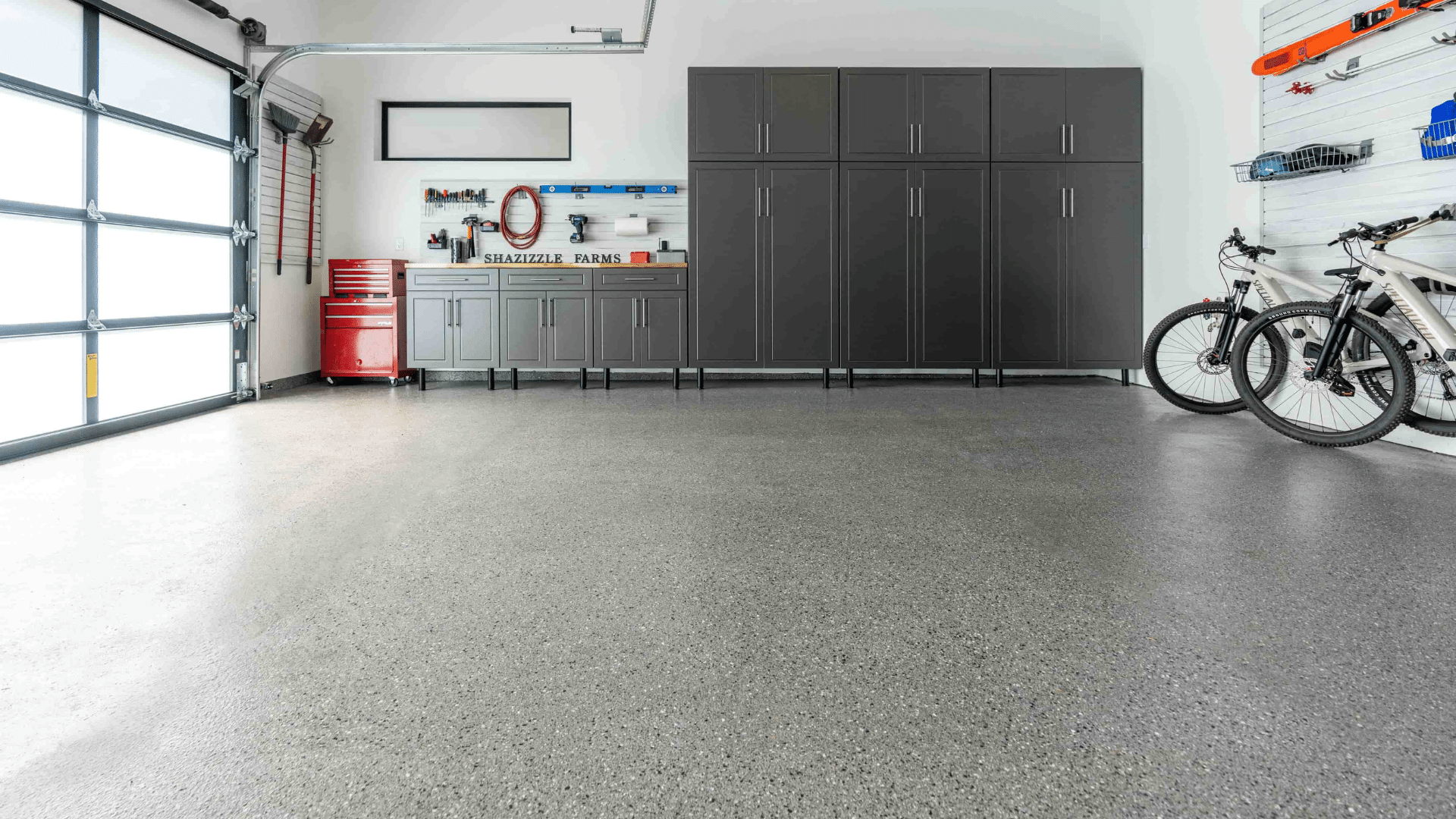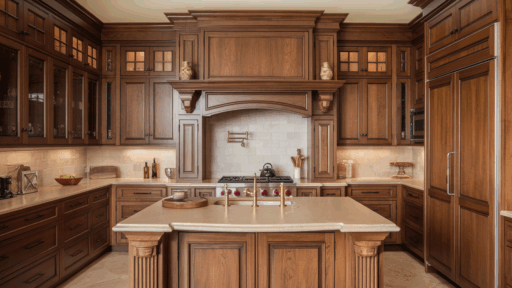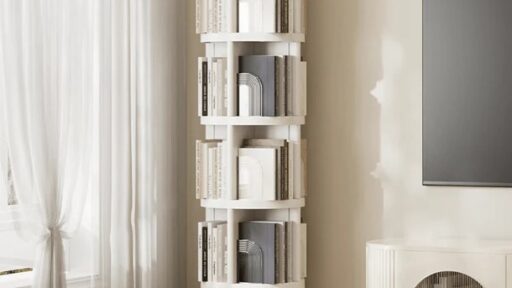When it comes to protecting and enhancing the look of your garage floor, polyurea garage floor coating is one of the best options available.
As a homeowner, I understand the importance of maintaining a garage floor that looks great while remaining durable and resistant to wear and tear.
Polyurea coatings offer an excellent solution because they are not only highly durable but also fast-curing, making the application process significantly quicker than that of other options, such as epoxy.
In this blog, I’ll explain to you what polyurea garage floor coating is, its benefits, and how it can improve the look and functionality of your garage.
If you’re considering upgrading your garage floor, this guide will help you make an informed decision.
What Is Polyurea Garage Floor Coating?

Polyurea garage floor coating is a top choice for homeowners looking to upgrade their garage floors.
Made from a mix of isocyanate and resin, it creates a strong, flexible surface that resists oil, gas, water, and harsh chemicals, ideal for garages that see heavy use.
One major benefit is its fast cure time, typically just 1 to 2 hours, compared to epoxy, which can take days to set.
It also resists UV rays so that it won’t yellow or fade in the sun.
The smooth, glossy finish gives your garage a clean, high-end appearance while also providing slip resistance for enhanced safety.
Easy to maintain and quick to apply, polyurea is a durable solution that combines both function and style.
Benefits of Polyurea Garage Floor Coating
Polyurea garage floor coating offers superior durability, fast curing time, resistance to chemicals and UV damage, and an attractive, long-lasting finish.
1. Durability and Strength
Polyurea coatings are incredibly strong, making them highly resistant to heavy traffic, impacts, and abrasions.
This is particularly useful in a garage where tools, cars, and other heavy objects are constantly being moved around.
The high durability of polyurea ensures that your floor will stay intact for years, with minimal wear and tear.
2. Fast Curing Time
One of the standout features of polyurea coatings is how quickly they cure.
While traditional coatings like epoxy can take days to fully cure, polyurea typically cures in just 1-2 hours, allowing you to use your garage much sooner.
This is ideal for anyone who needs a quick turnaround for their garage floor project.
3. Resistance to Chemicals and Moisture
Polyurea coatings are highly resistant to a variety of chemicals, such as oil, gasoline, and cleaning products.
In a garage setting, this is particularly important because these substances can damage unprotected concrete floors.
Polyurea also resists moisture, helping to prevent water from seeping into the concrete, which can cause cracks and deterioration over time.
4. UV Stability
Unlike epoxy, polyurea is resistant to UV rays, which means it won’t yellow or fade when exposed to sunlight.
This is especially important for garages that have windows or are exposed to direct sunlight.
Polyurea coatings will maintain their vibrant appearance for years, even with regular exposure to the sun.
5. Aesthetic Appeal
Polyurea coatings create a sleek, glossy finish that enhances the appearance of your garage floor.
With various color options and finishes available, you can customize your garage to match your personal style.
If you prefer a clean, solid color or a more decorative flake finish, polyurea coatings provide a beautiful and polished look.
How Much Does Polyurea Garage Floor Coating Cost?
Below is a quick breakdown of what polyurea garage floor coating might cost and what affects the price:
Average cost: $3 to $7 per square foot (materials + professional installation).
Two-car garage estimate: Around $900 to $2,500 total.
Factors that affect price:
- Size of the garage
- Quality of the polyurea product
- Labor and prep work
- Any floor repairs before coating
Extra features like flakes or textures can raise the cost.
DIY option:
- Saves on labor, but you’ll need to buy tools and materials.
- Expect extra time for surface prep and correct application.
Worth the cost? Higher than epoxy, but polyurea offers faster cure time, better durability, and less upkeep.
Polyurea Garage Floor Coating vs Other Flooring Options
This table compares polyurea with other popular garage flooring options, highlighting the benefits of polyurea and the drawbacks of other materials.
| Flooring Option | Polyurea Advantages | Other Flooring Option Drawbacks |
|---|---|---|
| Polyurea vs. Epoxy | Faster curing time, more flexible, superior UV resistance, and less prone to cracking in fluctuating temperatures. | Epoxy is rigid, prone to cracking, and takes longer to cure compared to polyurea. |
| Polyurea vs. Vinyl Flooring | More durable and resistant to punctures and tears, provides a seamless, glossy finish, and offers better chemical resistance. | Vinyl flooring is less resistant to damage from sharp objects and heavy tools, and it doesn’t have the same chemical resistance as polyurea. |
| Polyurea vs. Concrete Staining | More durable, provides superior chemical and moisture resistance, and offers a long-lasting, glossy finish. | Concrete staining is more affordable but lacks the protective qualities of polyurea and doesn’t offer the same level of durability. |
Maintenance and Care for Polyurea Garage Floor Coatings
Polyurea coatings are known for being low-maintenance, but regular care will help preserve the appearance and durability of your garage floor.
- Regular Cleaning: Sweep or dust mop the floor regularly and wash with a mild soap and water solution to maintain its shine and remove stains.
- Avoid Harsh Chemicals: Avoid using strong cleaning agents like bleach or ammonia, as they can damage the polyurea finish.
- Repairing Damage: Small cracks or chips can be easily repaired with a polyurea repair kit to keep the floor looking new.
- Keep Heavy Items in Place: Prevent dents or damage by keeping heavy objects off the floor for extended periods.
- Use Rugs or Mats in High-Traffic Areas: Placing rugs or mats in high-traffic areas helps protect the floor from wear and tear.
- Maintain Consistent Temperature: Keep the garage temperature stable to avoid potential damage to the polyurea coating due to extreme heat or cold.
- Periodic Inspection: Regularly inspect the floor for damage to ensure it remains in great condition and address minor issues promptly.
Conclusion
Polyurea garage floor coatings are a great choice for anyone wanting a strong, low-maintenance, and good-looking floor.
With fast curing, resistance to chemicals and UV damage, and long-term durability, polyurea offers real value.
I’ve covered the main benefits and simple care tips to help your floor stay in top shape for years.
It’s also easy to clean and can handle minor repairs, making it perfect for busy households.
If you’re thinking about upgrading your garage, polyurea is a smart and stylish option.
Start your project today and enjoy a floor that looks great and lasts.
Frequently Asked Questions
What is the difference between polyurea and epoxy garage floor coatings?
Polyurea cures faster, is more flexible, and offers better UV resistance compared to epoxy, making it a more durable and long-lasting option for garage floors.
How long does polyurea garage floor coating last?
Polyurea coatings can last anywhere from 10 to 20 years, depending on the level of maintenance, wear, and the garage’s exposure to chemicals and UV light.
Can I apply polyurea garage floor coating myself?
While it’s possible to apply polyurea yourself, it’s recommended to hire a professional for the best results, especially since preparation and proper application are crucial.
How long does it take for polyurea to cure?
Polyurea typically cures in 1-2 hours, allowing you to use your garage floor much sooner than other coatings, such as epoxy, which can take several days.
Is polyurea resistant to oil and chemicals?
Yes, polyurea is highly resistant to common garage chemicals such as oil, gasoline, solvents, and other harsh substances, making it ideal for garage floors.








